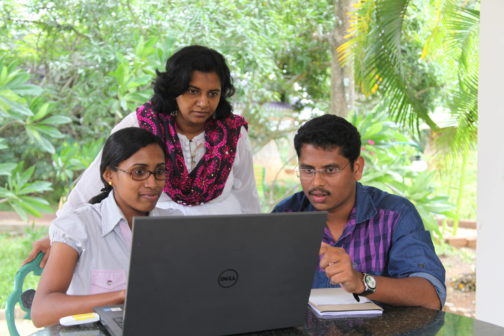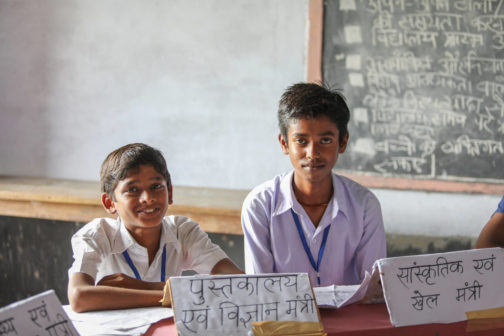Digital technologies have tremendous potential for scaling and sustaining the impact of various initiatives in education and skill development. We are yet to exploit them strategically in areas like primary and higher education, vocational training and teacher and trainer empowerment. This Skill Story about Quest Alliance is sure enlighten and convince you about how online technology can be seamlessly integrated in making learning playful, impactful and enriching both for the learners and facilitators. Let’s meet Aakash Sethi, Executive Director, Quest Alliance, to understand their vision, goals and the journey so far.
Focus on self-learning and acquiring life skills
 Our focus has always been on creating conversations about how can you scale existing learning interventions for greater impact by leveraging educational technology more effectively and efficiently. We work with teachers, trainers and facilitators since they form the core of any initiative. And when we train and empower them, it would be easy to scale up various programs. The challenge is not only training them but ensuring that they retain what they learnt in a training program or a workshop. So we were exploring options to provide ongoing support, just-in-time learning etc.
Our focus has always been on creating conversations about how can you scale existing learning interventions for greater impact by leveraging educational technology more effectively and efficiently. We work with teachers, trainers and facilitators since they form the core of any initiative. And when we train and empower them, it would be easy to scale up various programs. The challenge is not only training them but ensuring that they retain what they learnt in a training program or a workshop. So we were exploring options to provide ongoing support, just-in-time learning etc.
 Hence, in the initial phase our journey, we decided to build a digital toolkit for the trainer and facilitators who can learn these life skills themselves and then be able to deliver these skills to the learner. This was important to show that facilitator is not just the medium; he or she is a learner first. Hence, they need to learn and apply the concept on themselves, and when they reach a certain stage they can start delivering those skills to the learners. The toolkit has 45 hours of digital content with stories from existing facilitators in the form of structured e-learning.
Hence, in the initial phase our journey, we decided to build a digital toolkit for the trainer and facilitators who can learn these life skills themselves and then be able to deliver these skills to the learner. This was important to show that facilitator is not just the medium; he or she is a learner first. Hence, they need to learn and apply the concept on themselves, and when they reach a certain stage they can start delivering those skills to the learners. The toolkit has 45 hours of digital content with stories from existing facilitators in the form of structured e-learning.
The toolkit has been quite impactful and preparing the facilitators with 21st century skills. The blended learning paradigm gave importance to self-learning and the facilitators had to let go of control if they had to facilitate blended learning. They need to look beyond their own practices that they are used to and move from being the sage on the stage to guide on the side. It can be downloaded and used for free. We have 300 hours digital content dealing with life skills, career guidance, entrepreneurship, digital literacy and communication.
Evolution of MasterCoach©
Digitization of the content is only 1 -1/10th of the problem, the real thing is the value that gets created by the facilitator and how it gets transferred to the students. MasterCoach inducts facilitators into blended learning by making them go through learning module all by themselves. They learn about facilitation, pedagogy, building relationship with the learner and at the same time, they have access to tools to start creating those blended learning environments in their classrooms. It’s like double loop learning.
Our methodology doesn’t use the facilitator as a tool, we insist on treating them as individuals; there’s a significant shift that needs to go into their minds, making that shift from where they are to, where they need to be. Once they have a good view of the learning ecology, they can then manipulate things in desired ways to get results. Hence it’s critical to get them to become learners. That’s the mistake we are making in the skills space, same mistake was made in the education space and we have lessons from there that can be learnt and applied in the skills space. Analytics is another tool that can help the facilitator.
Establishing the industry connect
 First, the way we establish this seamless connect with the industry is very important. We need to emphasize on right things. Let’s remember the fact that the student is also seeking information on jobs and other opportunities. So, more than the industry coming to us, we encourage the students to do their own market research, talk to professionals in the real world and understand what opportunities exist and come back and map it using a mapping tool, explore jobs that match their knowledge and skills and that are close to their location and so on. That’s how we’ve defined our approach to industry engagement, there are ways to get mentors involved from the industry to give online classes and orientation.
First, the way we establish this seamless connect with the industry is very important. We need to emphasize on right things. Let’s remember the fact that the student is also seeking information on jobs and other opportunities. So, more than the industry coming to us, we encourage the students to do their own market research, talk to professionals in the real world and understand what opportunities exist and come back and map it using a mapping tool, explore jobs that match their knowledge and skills and that are close to their location and so on. That’s how we’ve defined our approach to industry engagement, there are ways to get mentors involved from the industry to give online classes and orientation.
The second point concerns the contribution of the industry to bridge the gap between skills and education divide. Many technology companies have come forward to make strategic investment in skills and education, by going beyond funding. Though many industries have started with CSR projects, they are not willing to engage strategically by influencing the curriculum, online learning design and strategy etc. The challenge is to get all of them together as a sector to create value.
Education and skills
We need to work on both ends, we cannot have skilling as a quick fix problem. As we know, all the problems related to education cannot be solved overnight and we need to start thinking 10 or 15 years ahead as opposed to thinking 10 months down the line. This is going to be a difficult journey, we may experience failure and we will have to reflect and learn. Today, education is hardly a space where apply basic principles of being human. It’s emerging as an inhuman system by perpetuating fear and stereotypes in the garb of passing the exams. This hardly leaves time for the child to enjoy childhood make learning a pleasurable activity.
 At the systemic level, there’s lot of trust deficit in the government system and it’s common for the parent to blame the teacher or the school if the student doesn’t perform well.
At the systemic level, there’s lot of trust deficit in the government system and it’s common for the parent to blame the teacher or the school if the student doesn’t perform well.
Anandshala©
Through Anandshala we are trying to provide the tools and changing the mindset of the educators. This is achieved in a scientific way without bias about caste, religion or gender by supporting children who need it most. The process involves creating enriching learning experience which could mean adding aspects of local art, local games, and being driven, students can showcase their talent in the school. The parents also participate in these conversations when they see their children’s performance.
We are trying to create a responsive and sensitive system in the rural areas. We are creating change agents inside the system who don’t just collect data to analyse the children’s performance, but engage with them meaningfully.













Comments 1